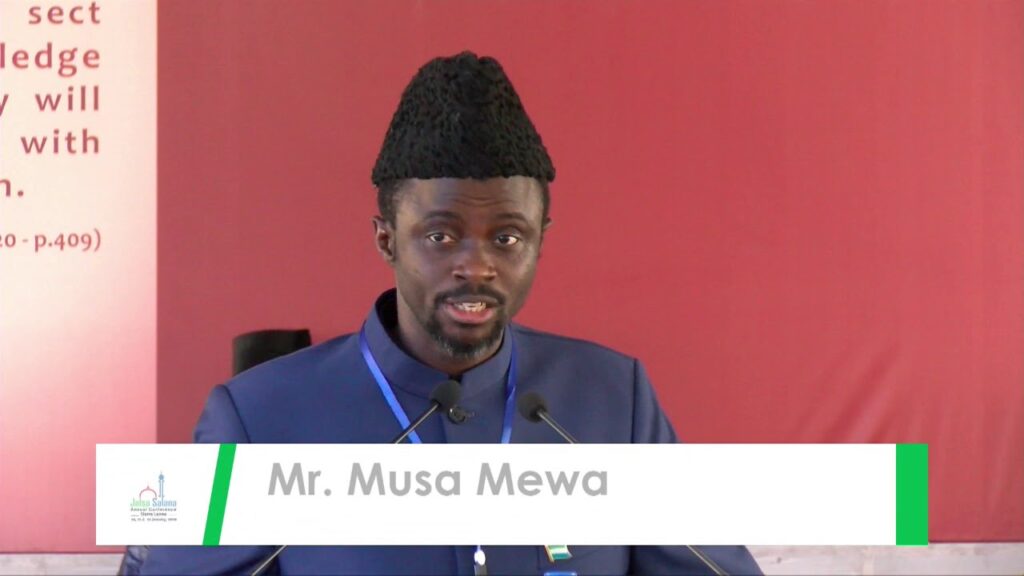It is a Monday afternoon and as dusk begins to fall on Freetown, Musa Mewa arrives at the Ahmadiyya headquarters on Bath Street where his team is already digging in on the huge pile of work that they have at hand. Unlike many other professionals who clock out and head home at the end of the day, Mewa leaves his law practice and spends his evenings doing what he says Allah has appointed him to do. As the new Amir of the Ahmadiyya mission in Sierra Leone, he divides his time between lawyering and heading a massive Muslim mission that is spread across the country.
As we arrive for our appointment with the first substantive Sierra Leonean Amir (head of the Ahmadiyya mission) in the country, he is already holding meetings with his staff and work visitors. Outside his modest office which is partitioned by a see-through glass wall, is a small secretariat where various nationals of Ahmadis chat and laugh as they type away on their computers, print documents and move files from point to point. It is a scene that begins to make sense when the Amir talks about his “brothers” who are important players in the work he does.
Although Mewa was born and raised in the Ahmadiyya jamaat, he never thought he would become an Amir, leading the mission’s century-old work in the country. But his family and upbringing had prepared him for the role, he said.
“I am not a trained missionary. I did not anticipate this. But it is Allah’s desire that I serve,” he said as he reflected on his historic appointment.
His late dad, a lifelong Ahmadi who worked for the mission as an administrator, accountant and educator, ensured that young Mewa got an Ahmadi education and grew up in the mission.
“My father never allowed me to attend any other school, even if I wanted to. I attended Ahmadiyya primary and secondary schools in Bo and if there was an Ahmadiyya university, I would have gone there.”
Few words his late dad told him before he passed on have been Amir’s guiding torch, he told Engage Salone. “Before he [father] died, he said ‘Musa, I leave you with two things: Ahmadiyya-tul Islam and education’”.
Mewa was appointed Amir of Ahmadiyya in Sierra Leone in June 2022 and many people suggest that he has a point to prove. Although he does not see it as such, Mewa understands the significance of his appointment and the challenge that it brings as he settles into an office that requires him to provide “spiritual and administrative leadership” to a jamaat of thousands of Sierra Leoneans and foreign missionaries working in the country.

Many Sierra Leoneans are familiar with the Ahmadiyya mission, either through its long history in education or its humanitarian work around the country, but until the appointment of Musa Mewa as the head of the mission, many did not really pay attention to the role of the Amir and the administration of Ahmadiyya.
As one Sierra Leonean observer, who is familiar with the Ahmadiyya mission put it, “Brother Mewa’s appointment gives a new face to Ahmadiyya in Sierra Leone and many non-Muslims have taken interest in the work of the Amir and Ahmadiyya because of him”.
This also means that Mewa has his work cut out for him as expectations are high. As he settles into the role, he already knows where he is headed and what he wants to be remembered for many years down the line. In line with the Ahmadiyya tradition in Sierra Leone, Mewa says he will prioritise education and continue to strengthen the mission’s capacity to deliver humanitarian work—something it has built a reputation for.
The Amir is trusting his consultative leadership style and relies on his national executive to deliver. He says he is already making changes to the administrative setup, establishing several committees to support the executive to efficiently implement programmes and communicate with members at all levels of the jamaat.
“The challenges are many”, Mewa said as he outlined the long list of things that require his urgent attention.
“We need to expand our schools because the population is growing and we do not have enough classrooms; we need to improve our health facilities and establish new ones because demand is increasing; we have missionaries across the country and they need mobility to spread the message to all corners”
The Amir also recognises that he cannot solve these problems within a short period. He said, “we are looking for opportunities for funding, we need to increase our revenues and the jamaat is already discussing these issues”.
Amidst the long to-do list, the Amir is already counting what he modestly calls “small gains”.
“We are strengthening the administration of the jamaat; we are moving towards acquiring 221 acres of land for future development; we have modernised our printing press with five colour printers; we are working on a mission policy on school management.”
Mewa said he had also started work on replicating the Ahmadiyya television channel, MTA in Sierra Leone. No surprise, considering Mewa’s background and education in media studies and journalism.
As Mewa moves on to implement his programmes, he is also counting on the mission’s huge human resource potential in Sierra Leone. “We want to attract more Sierra Leonean professionals to come on board and offer their expertise to the jamaat,” he said. “We already have some who are giving their time in service, and I want to have more of them come in and help,” he told Engage Salone. He said his plan was to build a local human resource pool that can serve the various institutions of the mission.
For a mission that started in Sierra Leone more than one hundred years ago, it is no surprise that it has its footprint across the country, providing education and healthcare services, among others. According to the Amir, the mission’s 300-plus schools and several health facilities around Sierra Leone are fundamental to Islam because “our purpose on earth is to serve God and humanity”.
“The impact of our service can be seen in the people we have educated and shaped, as well as the lives we have touched through our health services and our spiritual guidance,” the Amir said as he goes on to name a long list of prominent Sierra Leoneans who went through Ahmadiyya education—from vice presidents to ministers and other high profile people.
Mewa says it is not enough to be the first Sierra Leonean Amir. He wants to leave a legacy that Sierra Leoneans will be proud of.
“As a [Sierra Leonean] national, I want to have a very clear roadmap that puts the jamaat on a trajectory of development and progress,” the Amir said. “I am working with all the institutions of the jamaat to develop a strategic plan that explains where we are now, where we want to go and how to get there,” Mewa told Engage Salone.
On the future of the Ahmadiyya mission in Sierra Leone, Mewa sounded an optimistic note:
“I am very positive. I feel the future of the Jamaat is bright. I am bringing my experience from the secular world—law, media and civil society and I think it will be useful for managing the affairs of the jamaat and leading it to achieve our goals.”
About The Author
- This author does not have any more posts.


